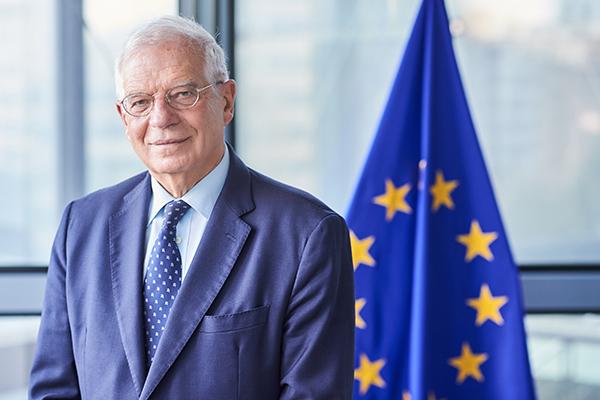ASTANA – Stability and prosperity is the shared interest for the benefit of people in Central Asia and Europe, said European Union (EU) High Representative for Foreign Affairs and Security Policy Josep Borrell in an interview with Kazinform published on Oct. 23, ahead of the meeting of the Foreign Ministers of the five Central Asian states and the EU (C5+1), as well as the 20th meeting of Kazakhstan-EU Cooperation Council in Luxembourg.

Josep Borrell. Photo credit: European Commission.
According to Borrell, the EU holds regular meetings with the five Central Asian countries at the level of foreign ministers. This year, the meeting was joined by 27 foreign ministers of the EU member states for the first time.
“Since adopting the EU Strategy on Central Asia in 2019, cooperation between the EU and Central Asia has advanced in many areas. However, the EU and Central Asia have many opportunities to advance this relationship in transport connectivity, green energy, trade, investment, security, water, climate, education, science, and people-to-people contacts. When it comes to challenges, we encourage our Central Asian partners to maintain and accelerate the pace of their reforms, and we stand ready to offer our continued support in this historic endeavor,” he said.
Borrell said the transport routes between Central Asia and Europe were on the agenda of the C5+1 meeting, mentioning the EU-financed study on sustainable transport corridors connecting the extended Trans-European Transport Network and the Central Asian countries.
“Based on the results of this study [published in June], we are now looking at enhancing the operational efficiency and economic attractiveness of the Central Trans-Caspian Network that encompasses major production and population centers in all five Central Asian countries. Based on our European experience – and in line with the recommendations made in the study – developing transport connections should be based on a regional approach to connectivity to ensure that they also contribute to the sustainable economic development of the entire Central Asian region,” he said.
According to Borrell, critical raw materials are an important and relevant new area of cooperation for the EU and Kazakhstan.
“In November last year, Kazakhstan also became the first country in Central Asia to sign a memorandum of understanding with the EU on a strategic partnership in raw materials, batteries and renewable hydrogen. The roadmap for implementing the agreement, endorsed in May this year, will ensure the development of a secure and sustainable supply of raw and refined materials. It also aims to develop renewable hydrogen and battery value chains, essential to boost the green and digital transformation in Kazakhstan and the EU,” he emphasized.
According to Borrell, access to water and managing scarce water resources is a high priority for EU-Central Asia relations. The EU has several projects and programs to assist Central Asian partners with managing water resources.
“The Team Europe Initiative on Water, Energy, and Climate Change launched in November 2022 will benefit from an EU contribution of 20 million euros (US$21.1 million). It will allow the EU to finance programs identified as priorities with other Central Asian countries under the International Fund for Saving the Aral Sea (IFAS) Basin Program, as well as a coordination mechanism for Team Europe,” he noted.
Borrell also focused on tackling the climate emergency, one of the European Union’s top foreign policy priorities. This topic is discussed at every meeting between the EU and its Central Asian partners, and there is a shared understanding of the challenges and the need to develop and adopt policies that ensure the transition to a net-zero emissions economy.
“Climate action brings opportunities both for the planet and the economy – including in terms of investment and finance opportunities, competitiveness, innovation, job creation, and economic growth, but also for the people in terms of better standards of living, health, decent jobs, sustainable food systems, and affordable energy prices. Therefore, the green transition, decarbonization, water management, and investment in renewable energy are central to the discussion with Central Asia,” he said.

